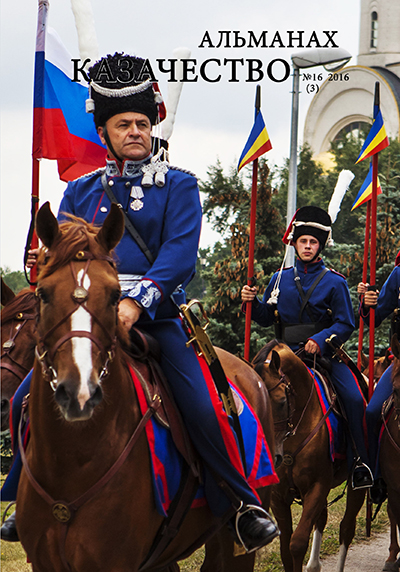Content
| Geopolitics and patriotic education | |
| Filonenko A.E. Military and Military-Technical Cooperation between Russia and the Central Asian Countries at the Present Stage | 7 |
| Bredihin A.V. On the Territory Disputes of Russia-Ukraine Frontier Zone | 17 |
| Zabolotskih A.S. The Idea of Human Rights as a Social Problem in Programs of Liberal Political Parties of the Early Twentieth Century | 23 |
| History | |
| Boltenkova L.F. Forms of Grass-Root Democracy in the Russian State in the Period of 9th – 16th Centuries | 33 |
| Ryabova E.I. Law Reinforcement of Grass-Root Democracy in Russia (17th-18th Centuries) | 47 |
| Varsonofiev V.V. Russian army and national policy. Part 3. | 54 |
| Cossack's party | |
| Strategic tasks and current issues of the Party | 67 |
| Abstracts | 73 |
| Authors | 77 |
Abstracts
Filonenko A.E.
Military and Military-Technical Cooperation between Russia and the Central Asian Countries at the Present Stage
The article is about military cooperation between Russia and the Central Asian countries: Kazakhstan, Kyrgyzstan, Tajikistan, Uzbekistan and Turkmenistan. A particular attention is paid to the interaction of the parties in the military-technical sphere. The author analyzes Russia’s assistance in strengthening the defensive capability of the Central Asian republics by means of strengthening its military bases and supply a wide range of defense products, as well as Russia’s role in providing a stable and secure development of the region as a whole. We consider the priorities of military cooperation of the participating countries at the moment and in the near future.
Keywords: Russia, Central Asia, military cooperation, military-technical cooperation, military education, the Organization of the Collective Security Treaty.
Bredihin A.V.
On the Territory Disputes of Russia-Ukraine Frontier Zone
The process of formation of the administrative borders of the USSR, especially in the borders issue, relied largely, on not ethnic, but political principle. Especially painful it was for the regions where on both sides of the borders Kazakhstan and Ukrainian SSR dominated. The consequences of these distinctions “opened up” just after the collapse of the USSR in 1991. Then closely related people, even family members sometimes, were of different nationalities. The new territorial disputes have resulted in protracted conflicts, with Nagorno-Karabakh as an example. In some republics these conflicts were «frozen», but acquired an acute phase in 2014 in the South-East of Ukraine, after nationalists came to power in the country. There is no doubt that the conflict was reflected in the neighboring Russian region, Rostov region. With one stroke of a pen Soviet bureaucrats could have put it in a today’s combat zone.
Keywords: Donbass, Ukraine, USSR, Dyachkino, Euroregion, border region, Don, Rostov-on-Don.
Zabolotskih A.S.
The Idea of Human Rights as a Social Problem in Programs of Liberal Political Parties of the Early Twentieth Century
The article describes the approaches of Russian liberals and their political organizations of the early twentieth century to the problem of human rights, as well as analyzes the reasons for human rights as a Western political and legal concept, and why they have not been implemented in the Russian Empire. The author gives some general ideas of liberal members of the public and their thoughts on civil rights and freedoms, as well as about the differences that arose among them in the evaluation of some of the issues (the right to vote in particular). The author concludes that liberal political parties were unable to effectively influence the majority of the population in the implementation of their plans.
Keywords: Russian liberalism, human rights and freedoms, the right to vote, Cadets.
Boltenkova L.F.
Forms of Grass-Root Democracy in the Russian State in the Period of 9th – 16th Centuries
Having analyzed statutory acts, the author gives some thoughts on the governance in Russia, its real self-administration, self-organization of people of different groups and social categories.
Keywords: Russian State, regulatory act, local authorities, grass-root democracy, self-administration
Ryabova E.I.
Law Reinforcement of Grass-Root Democracy in Russia (17th-18th Centuries)
In the article, it is emphasized that the traditions of self-administration, the so-called grass-root democracy, was maintained, in spite of absolute monarchy.
Keywords: absolute monarchy, Russia, monarchy, grass-root democracy, self-administration
Authors
Boltenkova L.F., Doctor of Legal Sciences, Professor of the Institute of Public Service and Administration of the Russian Presidential Academy of National Economy and Public Administration.
Bredihin A.V., Postgraduate student of the post-Soviet countries of Russian State University for the Humanities (Moscow). Graduate student of the post-Soviet countries.
Filonenko A.E., Theory and History of International Relations Chair People’s Friendship University of Russia.
Ryabova E.I., Candidate of Political Sciences, Head of Department of labour law, social security law and unions disciplines Institute of Economics and law (branch) of the Educational institution of trade unions of higher education “Academy of labour and social relations” in Sevastopol. (Havana).
Varsonofiev V.V., Candidate of Political Science, doctoral candidate of the Russian Presidential Academy of National Economy and Public Administration, Col.
Zabolotskih A.S., Intern at the Chair of history of Russian statesmanship in Russian Academy of national economy and public administration under the President of the Russian Federation.



